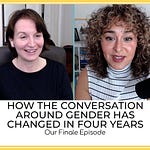In this episode, Sasha and Stella welcome Alex Byrne, philosopher and author, to explore the evolving concept of gender, its historical roots, and the myths that shape modern discourse. Byrne offers an erudite yet accessible analysis of the term "gender," reflections about how much the term has changed and the far-reaching implications of those changes, and insights on influential figures like Jack Turban and John Money.
Alex Byrne is a Laurance S. Rockefeller Professor of Philosophy at the Massachusetts Institute of Technology (MIT), and the author of Trouble with Gender: Sex Facts, Gender Fictions, published by Polity Press in 2024.
If you're trying to understand how people justify medical interventions or radical social identity changes for young children, it's essential to grasp the thinking behind the affirmation model, championed by figures like Jack Turban. And in this episode, Alex walks us through this perspective, making for a fascinating discussion.
Expect a thought-provoking conversation exploring:
Complexities and confusion surrounding the different meanings and uses of the terms 'sex' and 'gender'
The concept of gender identity and its relationship to sex and gender dysphoria
The work of Jack Turban and his book 'Free to Be'
The misunderstood and misrepresented nature of DSDs and the need for more attention and understanding
Resources & Links
Trouble with Gender: Sex Facts, Gender Fictions
@byrne_a on X
The New Free to Be Might Make You Long for the Seventies
Free To Be You and Me (the original album) on Spotify
Debate: Is Sex Binary? Co-hosted by the MIT Free Speech Alliance & Adam Smith Society
Is Sex Binary - Debate Review from Colin Wright
Check out Alex Byrne’s recommendations:
On Sex and Gender (book authored by Doriane Lambelet Coleman) focuses on three sequential and consequential questions: What is sex as opposed to gender? How does sex matter in our everyday lives? And how should it be reflected in law and policy?
The Campaign to Erase Biological Sex, by Doriane Lambelet Coleman











